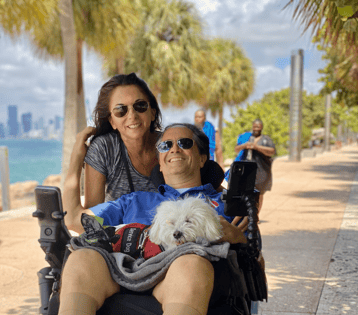Hope Happens Here: Lisa & Sergio
Join Our Movement
What started as an idea has become a national movement. With your support, we can influence policy and inspire lasting change.
Become an Advocate
“They were my angels,” Lisa says. “To this day, they’re still my 911 call.”
Reeve became a lifeline, a place Lisa could call day or night. And she did, reaching out nearly every day for months to untangle the red tape around insurance, to make sense of Sergio’s secondary conditions — to simply share her fears.
“You really can feel pretty alone,” she says. “But with Reeve, we knew we could call anytime, and we knew someone was going to pick up and talk to us calmly for as long as we needed.”
Reeve’s Information Specialists sent stacks of booklets and factsheets in English for Sergio and Lisa, but also in Spanish for Sergio’s home health aides. Throughout that first, difficult year, when Sergio broke his leg, was rushed to the hospital with sepsis, and suffered countless urinary tract infections, Reeve counseled the couple through each challenge.
“The Reeve Foundation anticipates a lot of things for us,” says Sergio. “And when they don’t have the answer, they know where to go or who to call to find the solution.”
This summer, Sergio made his long-awaited return to adaptive scuba diving as Lisa cheered him on. Both remain grateful for each other – and for the help and hope the Reeve Foundation has provided as they forge a new path forward.
“Nothing is impossible,” Lisa says. “It’s extremely important for the world to know if, God forbid, this terrible thing happens, the Reeve Foundation is there. They will help you through every step of the way. They will walk you through every one of your questions and fears. You will always have a person to talk to. If we didn’t have them, I don’t know if we would be here today.”
Connect with an Information Specialist here.
